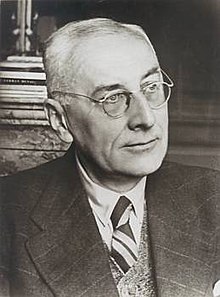Nicolaas Wilhelmus Posthumus
Nicolaas Wilhelmus Posthumus | |
|---|---|
 N. W. Posthumus | |
| Born | 26 February 1880 |
| Died | 18 April 1960 (aged 80) |
| Nationality | Dutch |
| Academic career | |
| Field | Economic History |
| Righteous Among the Nations |
|---|
 |
| By country |
Nicolaas Wilhelmus Posthumus or N.W. Posthumus (26 February 1880 in
Posthumus was one of the founders of both the International Institute of Social History in Amsterdam and the Faculty of Political and Social Sciences at the University of Amsterdam.
Biography
Posthumus was born as the son of
After graduation, Posthumus studied a few years of
Following the
After the war he wrote a history of the German occupation of the Netherlands entitled The Netherlands During German Occupation.
In 1929 Posthumus became member of the Royal Netherlands Academy of Arts and Sciences, he was forced to resign in 1942. In 1945 he was readmitted as member.[9] From 1946 to 1958, Posthumus was Director of scientific publisher Brill. From 1 January 1949 to his death, Posthumus was chairman of the Dutch Economic Historical Archive, which he founded in 1913.
On 20 July 1908 Posthumus married Marcel Dorothea van Loon, with whom he a daughter and a son. He divorced her in 1928. On 7 January 1931 Posthumus married his second wife
During the war, he and his family helped relocate Jewish children from Amsterdam to foster families. He and Willy cared for a child, Bertha Eveline Koster, in their own home from 1943 to 1945. Posthumus, Van der Goot, and sister-in-law Diaz-van der Goot received the "Righteous Among the Nations" recognition.[11] Posthumus and Van der Goot separated in 1950.
Notes
- ^ a b "N.W. Posthumus". About the Institute. International Institute of Social History. Retrieved 2008-08-18.
- ^ "International Institute of Social History:Some notes about IISH's history". Features about selective archives and their Trotskyana collections. TrotskyanaNet. Retrieved 2008-08-18.
- ISBN 979-10-351-0058-2.
- JSTOR 555355.
- S2CID 155041487.
- S2CID 144901896.[permanent dead link]
- ^ "Annual Report 2005 N.W. Posthumus Instituut" (PDF). N.W. Posthumus Instituut (NWP). 2005. p. 7. Retrieved 2008-08-20.[permanent dead link]
- ^ "Mission and Goals". N.W. Posthumus Instituut. University of Groningen. February 13, 2008. Archived from the original on October 5, 2008. Retrieved 2008-08-18.
- ^ "Nicolaas Wilhelmus Posthumus (1880 - 1960)". Royal Netherlands Academy of Arts and Sciences. Retrieved 30 July 2015.
- ^ Bosch, Mineke (13 November 2015). "Goot, Willemijn Hendrika van der (1897-1989)". Huygens ING (in Dutch). The Hague, The Netherlands: Huygens Institute for the History of the Netherlands. Archived from the original on 2 July 2017. Retrieved 1 August 2017.
- ^ "Posthumus Family". Yad Vashem. Jerusalem Israel: The Holocaust Martyrs' and Heroes' Remembrance Authority. 2008. Retrieved 2 August 2017.
